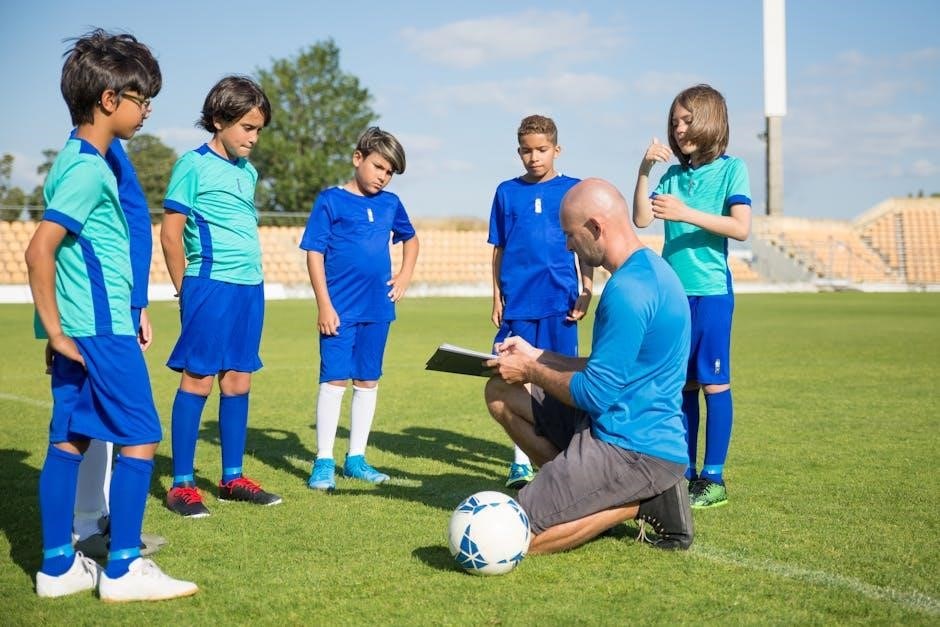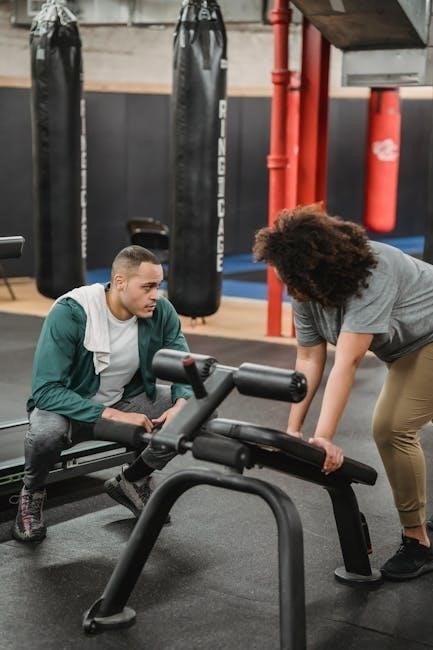Instructional coaching focuses on enhancing teacher effectiveness through targeted support and resources. Coaches provide professional development, improve teaching methods, and foster a collaborative learning environment. They utilize various supplies, including digital tools, organizational materials, and visual aids, to ensure impactful coaching sessions.
1.1. Definition and Role of an Instructional Coach
An instructional coach is an educator who works with teachers to improve instructional strategies, enhance student learning, and strengthen teaching practices. Their role involves providing professional development, modeling effective teaching techniques, and offering feedback. Coaches act as mentors, helping educators integrate new tools and methods into their classrooms. They focus on fostering a collaborative environment, supporting teachers in achieving their goals, and ensuring alignment with educational standards. By equipping teachers with innovative resources and strategies, instructional coaches play a pivotal role in elevating both teaching quality and student outcomes.
1.2. Importance of Instructional Coaching in Education
Instructional coaching is vital for enhancing teaching practices and improving student outcomes. By providing personalized support, coaches help educators refine their skills, adopt innovative strategies, and address specific classroom challenges. This collaborative approach fosters professional growth, leading to more effective instruction and increased student engagement. Coaching also promotes a culture of continuous improvement, ensuring educators stay updated with best practices and educational trends. Ultimately, instructional coaching plays a crucial role in elevating the quality of education and supporting the development of both teachers and students.
1.3. Key Responsibilities of an Instructional Coach
An instructional coach works closely with teachers to enhance teaching practices and improve student learning. Their responsibilities include modeling effective strategies, providing feedback, and supporting curriculum development. Coaches analyze student data to identify areas of improvement and help teachers implement evidence-based practices. They also facilitate professional development opportunities and collaborate with educators to design engaging lessons. Additionally, instructional coaches foster a culture of collaboration, offering resources and guidance to ensure teachers feel supported in their professional growth. Their role is pivotal in creating a positive and effective learning environment for both educators and students.

Essential Supplies for Instructional Coaches
Instructional coaches rely on a variety of supplies to support their work, including planning tools, digital resources, and organizational materials. These supplies enhance teaching methods, improve collaboration, and ensure effective student engagement, making coaching sessions more impactful and productive.
2.1. Physical Supplies for Instructional Coaching
Physical supplies are essential for instructional coaching, enabling hands-on activities and visual learning. Coaches use whiteboards, markers, sticky notes, and printed materials like lesson plans and data charts. These tools facilitate brainstorming sessions, demonstrate teaching strategies, and help track progress. Organizers such as binders and folders keep resources tidy, while charts and graphs aid in presenting information clearly. Additionally, educational games and manipulatives engage teachers and students, promoting active participation. These supplies create a dynamic and structured environment, fostering collaboration and effective instruction. They are indispensable for impactful coaching and professional development.
2.2. Digital Tools and Resources for Instructional Coaches
Digital tools are vital for instructional coaches to enhance teaching practices and student outcomes. Platforms like Google Classroom and Microsoft Teams facilitate collaboration and resource sharing. Educational software, such as Kahoot and Padlet, engages teachers and students in interactive learning. Coaches also use multimedia resources, including videos and podcasts, to demonstrate innovative strategies. Tablets and interactive whiteboards enable dynamic presentations and real-time feedback. Additionally, data tracking tools like Google Sheets and specialized coaching software help monitor progress and refine instructional approaches. These tools streamline communication, support lesson planning, and promote continuous professional growth.
2.3. Organizational Tools for Effective Coaching
Organizational tools are essential for instructional coaches to manage tasks efficiently. Digital calendars and task management apps like Trello or Asana help coaches schedule meetings and track progress. Google Sheets and Excel are used to organize data, such as teacher feedback and student outcomes. Physical tools like binders, folders, and checklists ensure materials are readily accessible. These tools enable coaches to streamline workflows, maintain clear communication, and focus on supporting teachers effectively. Proper organization enhances productivity, allowing coaches to dedicate more time to instructional improvement and teacher development.

Classroom Environment and Instructional Coaching
Instructional coaches play a vital role in shaping the classroom environment by implementing strategies that promote engagement, organization, and effective learning through targeted support and resources.
3.1. Setting Up a Supportive Classroom Environment
A supportive classroom environment is crucial for effective teaching and learning. Instructional coaches work closely with teachers to organize learning spaces, ensuring they are functional and engaging. Coaches provide guidance on arranging furniture, utilizing visual aids, and incorporating technology to enhance instruction. They also help create a positive atmosphere by promoting collaborative practices and fostering a growth mindset among students. By equipping teachers with the right tools and strategies, instructional coaches play a key role in establishing an environment that supports both teacher and student success. This collaborative approach ensures optimal learning outcomes.
3.2. Visual Aids and Their Role in Instructional Coaching
Visual aids are essential tools in instructional coaching, enhancing teaching and learning processes. Coaches use charts, graphs, videos, and interactive displays to make complex concepts clearer for teachers and students. These resources help in demonstrating effective teaching strategies and engaging learners. By incorporating visual aids, coaches can support teachers in lesson planning and delivery, ensuring content is accessible and understandable. Visual aids also promote student engagement and cater to diverse learning styles, making them a vital component of an instructional coach’s toolkit. They bridge gaps in understanding and foster a more dynamic learning environment.
3.3. Creating a Collaborative Learning Space
A collaborative learning space is vital for fostering engagement and innovation in education. Instructional coaches play a key role in designing environments that promote active participation. By incorporating flexible seating, interactive whiteboards, and collaboration software, coaches create spaces where teachers and students can share ideas and work together effectively. These setups encourage problem-solving, creativity, and teamwork. Coaches also ensure that technology is integrated seamlessly to support collaborative activities. A well-designed learning space not only enhances teaching practices but also empowers students to take an active role in their learning journey.

Instructional Coaching and Professional Development
Instructional coaching plays a pivotal role in professional development by providing educators with resources, training, and support to enhance their teaching strategies and foster collaboration.
4.1. Professional Development Resources for Coaches
Professional development resources for instructional coaches include workshops, online courses, and educational books. These tools help coaches refine their skills, stay updated on teaching strategies, and adapt to new technologies. Workshops often focus on specific areas like curriculum design or classroom management, while online platforms provide flexible learning opportunities. Books and research-based materials offer in-depth insights and practical techniques. Additionally, collaboration with experienced educators and participation in professional learning communities further enhance a coach’s effectiveness. These resources ensure coaches are well-equipped to support teachers and improve student outcomes effectively.
4.2. Workshops and Training Programs for Instructional Coaches
Workshops and training programs are essential for instructional coaches to enhance their skills and stay updated on educational trends. These sessions often focus on curriculum design, technology integration, and data-driven instruction. Coaches engage in hands-on activities, group discussions, and collaborative exercises to refine their coaching techniques. Many programs emphasize practical strategies for improving teacher effectiveness and student outcomes. By participating in these professional development opportunities, instructional coaches gain the tools and confidence to support educators more effectively, fostering a culture of continuous improvement in schools. These programs are tailored to address specific coaching challenges and evolving educational needs.
4.3. Building a Professional Learning Community
Building a professional learning community (PLC) is crucial for fostering collaboration and continuous improvement among educators. Instructional coaches play a key role in facilitating these communities by providing resources, guiding discussions, and encouraging peer learning. PLCs focus on shared goals, data-driven practices, and collective problem-solving to enhance teaching strategies. Coaches help educators reflect on their practices, implement innovative ideas, and support one another in addressing student needs. By nurturing a culture of collaboration and mutual support, PLCs empower teachers to grow professionally and improve student outcomes collectively. This approach ensures sustainable educational growth and innovation.

Technology and Instructional Coaching
Technology is a key component in modern instructional coaching, enhancing the effectiveness of coaching practices. Coaches utilize educational software, online platforms, and digital tools to facilitate collaboration, analyze data, and provide feedback.
5.1. Educational Software for Instructional Coaches
Educational software plays a vital role in instructional coaching, offering tools to enhance teaching strategies and student outcomes. Platforms like Google Classroom and Microsoft Teams facilitate resource sharing and collaboration. Specialized software, such as Edmodo or Schoology, enables coaches to track progress, provide feedback, and align instruction with curriculum goals. These tools also support data-driven decision-making, helping coaches identify areas for improvement. By leveraging these technologies, instructional coaches can streamline their processes, fostering a more effective and efficient learning environment for both teachers and students;
5.2. Online Platforms for Coaching and Collaboration
Online platforms are essential for instructional coaching, enabling seamless collaboration and resource sharing. Tools like Trello and Asana help organize coaching tasks, while Zoom and Google Meet facilitate virtual meetings. Platforms such as Padlet and Mentimeter support interactive discussions and real-time feedback. These tools enhance communication between coaches, teachers, and students, fostering a collaborative environment. By leveraging these platforms, instructional coaches can efficiently manage their workflows, provide timely support, and strengthen educational outcomes. They play a crucial role in modern coaching practices, ensuring effective teamwork and resource accessibility;
5.3. Integrating Technology into Coaching Practices
Technology plays a vital role in enhancing instructional coaching practices. Tools like Kahoot and Quizlet engage students, while platforms such as ClassDojo support behavior management. Data analysis tools, including BrightBytes and Tableau, help coaches track student progress and make data-driven decisions. Additionally, AI-powered tools like Grammarly and Turnitin assist with feedback and plagiarism checks. By integrating these technologies, coaches can streamline their workflows, personalize learning experiences, and improve overall educational outcomes. These tools not only enhance efficiency but also foster innovation in coaching methodologies, ensuring a more dynamic and effective approach to teaching and learning.

Data-Driven Instructional Coaching
Data-driven coaching relies on assessments and progress tracking to identify learning gaps. Coaches use tools like BrightBytes and Tableau to analyze data, informing targeted strategies.
6.1. Using Assessment Data to Inform Coaching
Instructional coaches leverage assessment data to identify learning gaps and tailor coaching strategies. By analyzing student performance metrics, coaches can pinpoint areas needing improvement. Tools like BrightBytes and Tableau help visualize data, enabling coaches to track progress over time. This data-driven approach allows for targeted interventions, ensuring resources are allocated effectively. Coaches collaborate with teachers to refine instructional methods, using data to inform decisions and enhance student outcomes. Regular monitoring of progress ensures coaching strategies remain impactful and aligned with student needs. This collaborative, data-informed process fosters continuous improvement in teaching and learning.
6.2. Tools for Tracking Student Progress
Instructional coaches utilize tools like Google Classroom, BrightBytes, and Tableau to monitor student progress. These platforms provide real-time data on performance, enabling coaches to identify trends and areas for improvement. Tools such as progress dashboards and automated reports offer insights into student learning outcomes. Coaches can share these findings with teachers to inform instructional strategies. Additionally, digital portfolios and learning management systems allow for tracking individual student growth over time. These tools enhance the ability to provide targeted support, ensuring personalized learning experiences for students. They play a vital role in data-driven coaching practices.
6.3. Analyzing Data to Improve Instructional Strategies
Instructional coaches use data analysis tools to interpret student performance metrics, identifying trends and areas for improvement. By examining assessment results, coaches can pinpoint knowledge gaps and recommend tailored strategies. They collaborate with teachers to refine instructional methods, ensuring alignment with student needs. Data-driven insights help coaches develop targeted interventions and monitor progress over time. This analytical process enables coaches to support educators in creating more effective lesson plans, ultimately enhancing student learning outcomes. Effective data analysis is a cornerstone of impactful instructional coaching practices.

Communication and Collaboration Tools
Instructional coaches rely on tools like Zoom, Google Workspace, and Trello to facilitate communication and collaboration with teachers, ensuring alignment and effective planning.

7.1. Effective Communication Strategies for Coaches
Effective communication is critical for instructional coaches to build strong relationships with teachers and stakeholders. Coaches should practice active listening, ask clarifying questions, and provide clear, concise feedback. Regular check-ins and scheduled meetings help maintain open lines of communication. Using digital tools like Zoom or Google Workspace fosters collaboration and ensures alignment on goals. Coaches should also adapt their communication style to meet the needs of individual teachers, promoting a supportive and non-evaluative environment. This approach helps coaches navigate conversations effectively, ensuring mutual understanding and successful outcomes.
7.2. Collaboration Tools for Coaches and Teachers
Collaboration tools are essential for instructional coaches to work effectively with teachers. Digital platforms like Zoom, Google Workspace, and Microsoft Teams facilitate real-time communication and shared document editing. Tools such as Trello or Asana help organize tasks and track progress. Coaches can also use shared databases for resource libraries or lesson plans. These tools enhance transparency, streamline workflows, and ensure alignment on goals. By leveraging these technologies, coaches and teachers can collaborate seamlessly, fostering a productive and supportive partnership focused on student success and professional growth.
7.3. Building Strong Relationships with Stakeholders
Building strong relationships with stakeholders is crucial for instructional coaches to ensure alignment and support. Coaches use supplies like communication guides, empathy maps, and feedback mechanisms to foster trust and collaboration. Tools such as digital survey platforms and one-on-one meeting templates help gather insights and address concerns. Transparency and consistency in communication are key, utilizing supplies like progress reports and documentation tools to maintain open lines of dialogue. These resources help coaches build a supportive environment, ensuring that all stakeholders feel valued and involved in the coaching process.

Instructional Coaching and Student Engagement
Instructional coaching plays a vital role in enhancing student engagement by providing teachers with strategies and resources to create interactive and meaningful learning experiences. Coaches utilize supplies like educational games, multimedia tools, and hands-on activities to support engaging lesson plans. These resources help foster an environment where students are actively involved, motivated, and eager to participate, ensuring a more effective and enjoyable learning process.
8.1. Strategies to Increase Student Engagement
Instructional coaches play a crucial role in helping teachers implement strategies that boost student engagement. One effective approach is the use of educational software and digital tools, which provide interactive and immersive learning experiences. Coaches often recommend incorporating visual aids, such as videos and infographics, to make lessons more dynamic; Additionally, hands-on activities and group projects encourage active participation and collaboration. Coaches also emphasize the importance of personalized learning plans, allowing students to take ownership of their education. By fostering a supportive and inclusive classroom environment, coaches help teachers create engaging lessons that cater to diverse learning styles and needs.
8.2. Coaching Techniques to Support Student Motivation
Instructional coaches employ various techniques to help teachers foster student motivation. One key strategy is goal-setting, where coaches guide teachers in helping students establish achievable objectives. Coaches also emphasize the importance of personalized learning plans, allowing students to take ownership of their progress. Additionally, coaches encourage the use of formative assessments to track growth and provide timely feedback. By incorporating positive reinforcement and celebrating small successes, coaches help create a supportive environment that encourages student perseverance and confidence. These techniques not only motivate students but also enhance their overall learning experience.
8.3. Creating Engaging Lesson Plans with Coaching Support
Instructional coaches play a pivotal role in helping teachers design engaging lesson plans that captivate students and promote deep learning. Coaches often introduce interactive activities, such as hands-on experiments or collaborative group work, to make lessons more dynamic. They also encourage the integration of technology, like educational software or multimedia resources, to enhance student participation. By providing guidance on differentiation strategies, coaches ensure that lessons cater to diverse learning needs. Additionally, coaches help teachers incorporate formative assessments to track progress and adjust instruction accordingly. These collaborative efforts aim to create a more immersive and effective learning experience for all students.

Future Trends in Instructional Coaching
Emerging technologies and AI are reshaping instructional coaching, offering innovative tools for personalized learning and data-driven strategies to enhance teacher and student outcomes effectively.
9.1. Emerging Technologies in Instructional Coaching
Emerging technologies are transforming instructional coaching by providing innovative tools for personalized learning and real-time feedback. AI-powered platforms now offer adaptive learning strategies, enabling coaches to tailor their approaches to individual teacher needs. Virtual reality (VR) and augmented reality (AR) are being explored to create immersive training environments. Additionally, advanced data analytics tools allow coaches to track progress more effectively and make data-driven decisions. These technologies not only enhance the efficiency of coaching but also ensure that teachers and students receive cutting-edge support. As a result, instructional coaching is becoming more dynamic and impactful.
9.2. Innovative Coaching Methods and Supplies
Innovative coaching methods are revolutionizing how instructional coaches support educators. One key approach is the use of interactive and collaborative tools, such as AI-driven software, to create personalized learning plans. Coaches are also leveraging gamification techniques to engage teachers in professional development. Additionally, the integration of real-time feedback systems allows for immediate adjustments in teaching strategies. These methods are supported by cutting-edge supplies, including virtual whiteboards, interactive simulations, and data analytics platforms. Together, these innovations enhance teacher effectiveness and student outcomes, fostering a more dynamic and adaptive learning environment.
9.3. The Role of AI in Supporting Instructional Coaches
AI is becoming a transformative tool for instructional coaches, enhancing their ability to support educators effectively. AI-powered platforms analyze vast amounts of data to provide personalized recommendations for teaching strategies. These tools also automate routine tasks, such as progress tracking and resource curation, freeing up coaches to focus on more critical tasks. Additionally, AI-driven chatbots offer real-time assistance, helping coaches address teacher inquiries instantly. By integrating AI into their workflows, instructional coaches can deliver more tailored and impactful support, ultimately improving student outcomes and teacher development. This technology is reshaping the future of coaching.

